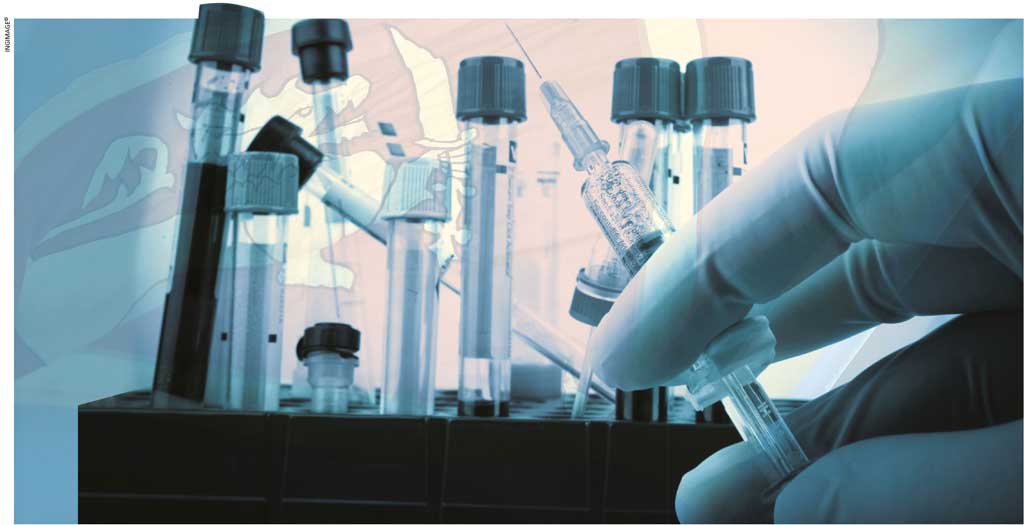STATE OF THE NATION

THE DRIVE TO A BRAVE NEW FUTURE WORLD?
Wijith DeChickera watches with relief as the state expedites inoculating its citizens while wondering where political developments will take us
A duality has characterised the nation of late… whereby despite the desirability of ‘One Law, One Country,’ there are exceptions to the rule and double standards persist where uniform discipline should prevail.
 It’s an unwelcome ethos in which some citizens appear more equal than others. Where, by virtue of the society we’re becoming under this regime – paternalistic, neo-elitist and nepotistic – an inequitable sociopolitical culture dominates.
It’s an unwelcome ethos in which some citizens appear more equal than others. Where, by virtue of the society we’re becoming under this regime – paternalistic, neo-elitist and nepotistic – an inequitable sociopolitical culture dominates.
There’s danger – and disaster – ahead on our national journey if government insists on interpreting citizen protests at economic and social hardships faced as being politically motivated.
Quarantining bailed dissenters is ultra vires an independent judiciary and could erode the people’s support for a once popular undertaking: the restoration of law and order, in a just, virtuous society.
The state must infuse a rigorous transparency into vaccination protocols. Delayed procurement of adequate stocks is being made amends for of late. Though payment for these is a price the country has to pay, one wishes the rhetoric around it would not be redolent of nationalistic victories.
Communication of vaccination programmes has generally lacked vigour. Civil society has had to intervene on social media to galvanise the inoculation drive.
As regards a short-lived mix and match regimen, what was the priority given to the vaccines administered? Are the elderly, critically ill and those with potential comorbidities such as serious noncommunicable diseases prioritised after a long agonising hiatus?
Have front liners in the battle against COVID-19 been suitably inoculated and adequately equipped, and their grievances addressed? Crippling strikes by nursing and public health unions would suggest not…
The good news however, regarding the government’s accelerated vaccination drive, is a great relief. Following trade union inaction, our stalwart security forces stepped in for absent strikers and rendered yeomanly service, doing their commander in chief proud.
Indeed, the president’s ambitious plans to vaccinate the nation at large are commendable. If the executive will prevails, those over 30 in the Western Province will be fully vaccinated by now. Thirteen million citizens islandwide would have been inoculated by end-September. Fresh consignments of vaccines have deplaned regularly.
As we march forward – admittedly with some missteps, and allegations of favouritism fuelled by selfish elites and their political patrons – herd immunity seems on the cards. The respite this will afford the nation in general and economy in particular is inestimable.
A great pity our parliament remains mired in bickering, partisan agendas and petty attacks on their fellows’ reputations when it’s apparent that a paternalistic political culture prevails outside those precincts.
The character of civics and governance tarnishes the good name given to technocratic government by the goodwill of a majority of the people who had grown tired of the foibles of feeble administrations of the past.
Despite unassailable legislative majorities and sterling constitutional amendments to empower the executive, this administration seems unable to make up its mind (witness sundry cabinet reversals of policy decisions) and embraces an unjustifiable autarky – a sense of self-sufficiency not borne out by ground realities.
The forex and fertiliser crises are prime examples.
In the case of the former, if there’s a bailout plan… we’d like to know – not be told it’s ‘all under control.’ As for the latter, any project short of rational planning and sustainable implementation smacks of paternalism if it’s being done ‘for the common good’ but sans voluntary inclusive participation.
A welcome exception resonant in his election manifesto was the president putting his foot down on Sri Lanka’s power and energy mix, directing the bureaucracy away from our debilitating reliance on fossil fuels.
But a dark cloud may hang over certain presidential pardons, which challenge the seemingly arbitrary executive prerogative and question whether procedural propriety – consulting requisite judicial and ministerial colleagues – was observed.
Or is arrogance at best, or authoritarianism at worst, a new political fiat?
Add to that mix concerns over nepotism and the fat is in the fire. In recent developments reminiscent of an erstwhile regime, 20-odd posts in various governmental and state offices are held by members of one family. Is our governance ‘bulk cabalism’?
The issue is one of virtue – is it just and fair to centralise power in one entity? And also, will it get the job (development in the best national interest) done in due time?
There has been discussion on social media about how autocracy and nepotism, characterised the meteoric rise and stellar performances of South East Asia’s erstwhile tiger economies.
The region’s so-called ‘most successful dictatorship’ dispensed with civil and human rights, as well as transparency and accountability, to get there. Will the appealing Singapore model give Sri Lanka a free pass en route to our present destination?
Our country is at another crossroads on top of the precarious yet opportune geopolitical position it presently occupies. Are we going along a golden route to become a mini-Malaysia in the medium term… a self-sufficient nation that is ‘truly Asia’ and an economic miracle?
Or will the lure of lucre and personal ambition drive our country down the road to Mandalay – to become a client state playing vassal to manipulative foreign powers on their own silk road?
Will the appealing Singapore model give Sri Lanka a free pass…? Our country is at another crossroads on top of the precarious yet opportune geopolitical position it presently occupies




Leave a comment